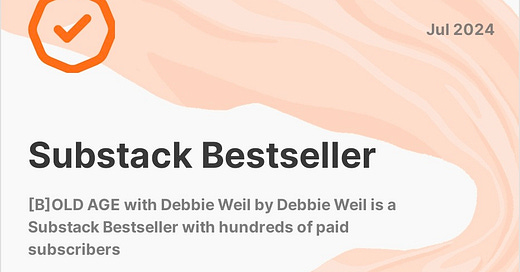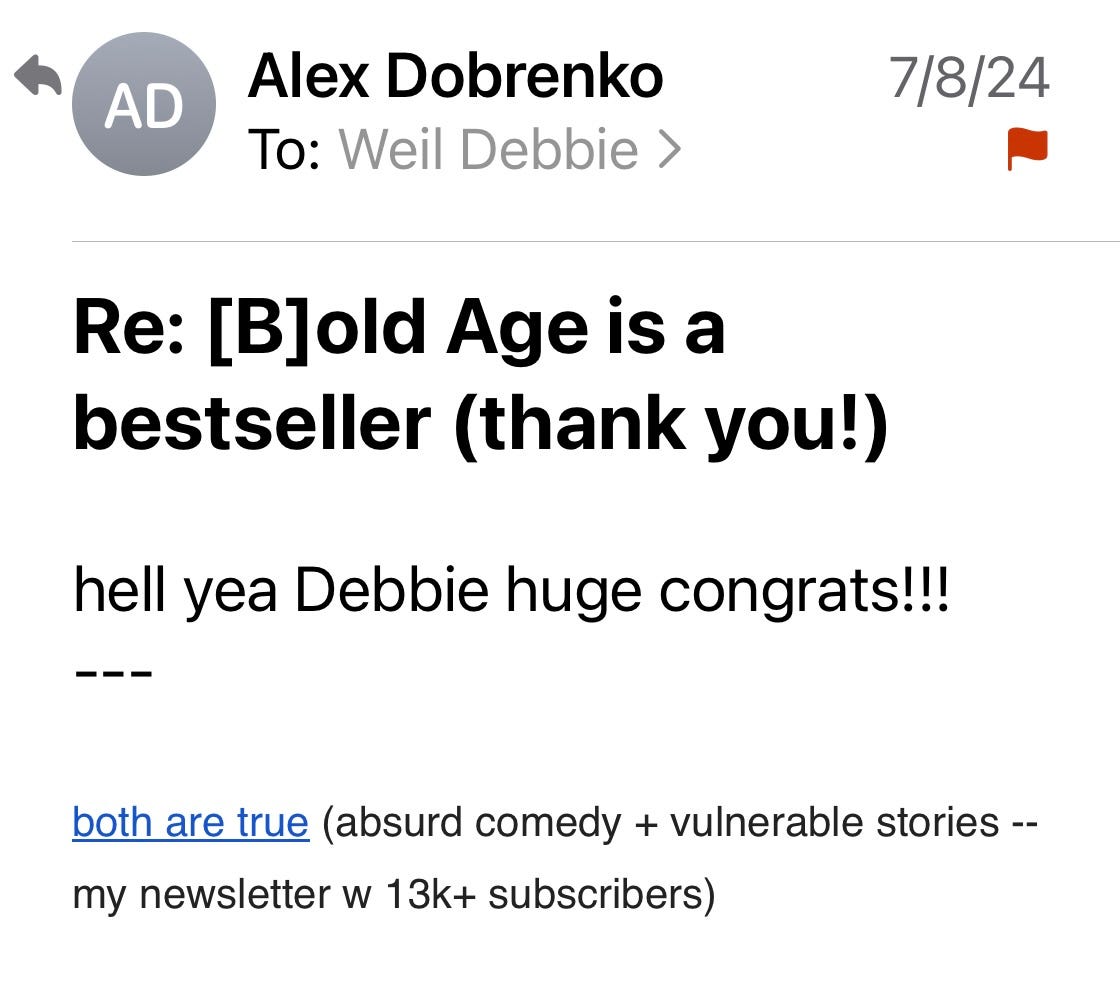For a [b]old woman, the double edge of a Bestseller checkmark
At 72, my new Substack badge feels so validating. It also stirs up self-doubt.
When Substack recently awarded this newsletter a bestseller checkmark, it felt like an Olympics victory: I leapt up, punched the air, and shrieked. What sweet success, I thought! Then, the king of absurdity and self-deprecation
sent me a congrats email.If Alex, a bestselling Substack writer with hundreds of paid subscribers, said my elation was justified, then it was!! As a fellow self-deprecator, I responded, “Of course I don’t actually explain that bestseller just means more than 100 paid subs … but it sounds good.” Alex shot back: “As the king of the minimize I forbid you to minimize this lol! It’s a big big big fucking deal :)”
Yes, Alex, this is a big deal!
So today I want to tell you why a bestseller checkmark really is a big deal for me, why it is vindication as well as validation, and how it also brings up negative feelings. It’s hard for me to celebrate success without awakening doubts; and in this case, the self-doubt is amplified by my reptilian writer’s brain. Side-by-side with elation, that brain asks: Am I really good enough? What am I trying to prove? Where am I going with this newsletter? Why am I doing this and is it worth the effort? Maybe you can relate to a dual response to what looks, at first glance, like success. (Meet me in the comments below!)
About Alex and me
I’ve gotten to know Alex a bit, ever since I wrote about how I’m still looking for acceptance and approval and how, improbably, he (a 30-something man) and I (a 70-something woman) share a lot of the same anxieties. One thing we both struggle with is imposter syndrome; although we may appear successful and accomplished on the outside, on the inside we can feel crummy about ourselves. Alex, to his credit, does admit to this, using his signature, looney humor to explain it. I don’t talk enough about how my (signature) lack of self esteem affects everything, including what it’s really like to be writing again as I enter [b]old age.
First, I felt tremendously validated
When that orange checkmark1 popped up (it happens automatically when you reach a certain number of paid subscribers), I felt the instant thrill of validation: Now I can say [B]OLD AGE is a bestseller! Job well done! Subscribers want to support my work! My topic (blessings and bullshit)2 resonates! Along with a feeling of vindication: All the hard work of the past year, rewarded! I also felt the darker, more familiar pangs of self-doubt related to accomplishment and expectations. If my parents were still alive (they both died recently, in their 90s), would this marker of success have helped us communicate better? My father always wanted to know how many and how much…
[B]old and not done yet
A particular thrill is that this checkmark proves I am truly [b]old; I’m not done yet! I’m so lucky to be in good health and relatively vigorous in my 70s and have time for new pursuits, new ideas, and unspoken dreams. One of those dreams is to reclaim my identity as a writer, and hey, I’m doing it! That is a blessing; it’s bullshit to think that I, or anyone 65+, is too old to make a dream come true or to make a mark on the world.
But another definition of “bullshit” is more nuanced: old age naturally brings with it degenerative changes in body and mind; it’s foolish to deny them. It’s bullshit to insist that you are just the same in strength and capacity at 803 as you are at 60. You are not (I am not); and it requires [b]oldness to embrace that evolving reality, and adopt new ways of living fully. This is the quandary of [b]old age that I will keep writing about.
Payment = value = success
External validation in the form of payment is pretty simple: money equals value; and often, more money means the writer is providing more value. On Substack, some might quibble that this is old-fashioned thinking about what constitutes success for a writer. But then I am old-fashioned when it comes to writing and publishing; I absolutely believe that professional writers should get paid for their work. For me, the bestseller badge is particularly meaningful because it’s not about total revenue, it’s about how many subscribers are willing to pay. For me, given my background as a journalist, there is legitimacy to the money / value equation. So, yes, it makes me giddily excited to have this newsletter become a “bestseller.”
Then, I felt the pain of comparison, envy, and grief
However, along with this thrill of justification for my work comes a wave of self-doubt. It takes various forms: Is bestsellerdom enough to push back against disapproval from a few family members who object to my more revealing essays? Probably not. Another dent in my celebration are the demons of comparison and envy: What about other Substack writers who have MORE paid subscribers? What are they doing that I am not; how is their writing better? Will I ever be that popular? And those reptilian questions again: Where am I going with this newsletter? Why am I doing this and is it worth the effort?
Finally, along with “Hooray, I have a checkmark now!” creeps back the complicated grief I feel since the deaths of both my parents in the past 18 months. I will never be able to put things right with them. It’s not that I was right and they were wrong, per se, it’s that there were so many misunderstandings on both sides. I want to sort this out fairly, to be [b]old and honest about my messy and unresolved feelings. I feel driven to write about this topic of complicated grief, even when it’s hard and scary. So, another why for this newsletter.
It’s complicated, but hell yea!
Back to Alex’s exhortation NOT to minimize the importance of a Substack Bestseller badge… truly, I’m not! It feels great to be supported, to get a stamp of approval, to be reinvigorated as a writer. But it’s so much more complicated than that. Validation operates on many levels and stirs up so many conflicting feelings; absorbing success is never quite complete. (The Olympic athletes tell you that every time they’re interviewed after winning a competition!) Maybe the best thing is that this little orange checkmark has caused me to reflect, to ask some important questions, and to take a moment to express real gratitude to those readers who choose to pay. Thank you!
Questions for readers
Is success a double-edged feeling for you?
Do you measure success differently than when you were younger?
An orange check mark on a white badge means the Substack writer has more than 100, and less than 1,000, paid subscribers. A white checkmark on an orange badge means the writer has more than 1,000, but less than 10,000, paid subscribers. A white checkmark on a purple badge means over 10,000 paid subs (hello Heather Cox Richardson).
This newsletter is about [b]old age, from the blessings to the bullshit.
Biden’s insistence on “nothing has changed” was, for me, painful to watch. His greater courage was to step aside.
![[B]OLD AGE with Debbie Weil](https://substackcdn.com/image/fetch/$s_!i8Z0!,w_80,h_80,c_fill,f_auto,q_auto:good,fl_progressive:steep,g_auto/https%3A%2F%2Fsubstack-post-media.s3.amazonaws.com%2Fpublic%2Fimages%2Fdaaca764-d8d6-4a1b-bf58-61dbb72810fc_842x842.png)
![[B]OLD AGE with Debbie Weil](https://substackcdn.com/image/fetch/$s_!fEcd!,e_trim:10:white/e_trim:10:transparent/h_72,c_limit,f_auto,q_auto:good,fl_progressive:steep/https%3A%2F%2Fsubstack-post-media.s3.amazonaws.com%2Fpublic%2Fimages%2F95ad4442-e435-4ebc-a8d2-9c9b89a8bdb6_2100x400.png)

![[B]OLD AGE with Debbie Weil](https://substackcdn.com/image/fetch/$s_!i8Z0!,w_36,h_36,c_fill,f_auto,q_auto:good,fl_progressive:steep,g_auto/https%3A%2F%2Fsubstack-post-media.s3.amazonaws.com%2Fpublic%2Fimages%2Fdaaca764-d8d6-4a1b-bf58-61dbb72810fc_842x842.png)




Debbie, Your post reminds me of an incident many years ago. In my first year as a full-time university faculty member, I was expressing to another junior colleague the strangeness of sudden elevation from a graduate student scraping by on a stipend, when she stopped me and told me my feelings had a name: imposter syndrome. "I feel it, too," said my fellow first-year faculty member with a PhD from Harvard and a competence that could slay dragons with a look.
Just that single moment of coaching did me so much good.
Thank you for telling the [b]old truth! We're all in this together, not for numbers or checkmarks but for the strong, encouraging relationships and the inspiring web of readers and writers they represent. For what your checkmark *represents*, congratulations, and much joy!
Congratulations!
And looking forward to reading a bunch of the essays referenced in this one.
I used to be a bit down on myself about how necessary external validation felt: it seemed like a character flaw.
The need was especially palpable in work contexts: when I was teaching, for instance, students would say lovely things, but I needed occasional pats on the shoulder from colleagues too, and from the head of the department — just as simple as a “congratulations” on a new article, that kind of thing. Without those, I withered.
For many years, I just accepted the fact that I withered without the occasional shoulder pat as something wrong with me, a form of greediness or some such thing.
Now, with more age and experience, I realize that that was nonsense. To want to be seen — really seen, I mean, not “look, I’m famous” seen — feels like a sign of desire for connection between human beings. Part of being a social animal is wanting to make contributions, and an element of that is wanting to having one’s contributions be taken seriously.
So my approach to this kind of major landmark is, enjoy the hell out of it, so long as one has confidence that what one is putting out into the world aligns with one’s values, and as long as it remains an outcome and not a driver of what one does.
And also, to reinforce it for others. Sharing pats on shoulders whenever they’re appropriate feels like such a simple, but essential, gift we can offer each other, and that includes sharing in the pleasure of landmark moments